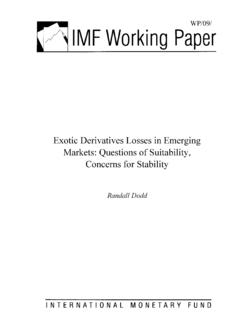Transcription of Competition and Financial Markets - OECD.org
1 Competition and Financial Markets KEY FINDINGS 2009 Competition and Financial Markets KEY FINDINGS 2009 ORGANISATION FOR ECONOMIC CO-OPERATION AND DEVELOPMENT The OECD is a unique forum where the governments of 30 democracies work together to address the economic, social and environmental challenges of globalisation. The OECD is also at the forefront of efforts to understand and to help governments respond to new developments and concerns, such as corporate governance, the information economy and the challenges of an ageing population.
2 The Organisation provides a setting where governments can compare policy experiences, seek answers to common problems, identify good practice and work to co-ordinate domestic and international policies. The OECD member countries are: Australia, Austria, Belgium, Canada, the Czech Republic, Denmark, Finland, France, Germany, Greece, Hungary, Iceland, Ireland, Italy, Japan, Korea, Luxembourg, Mexico, the Netherlands, New Zealand, Norway, Poland, Portugal, the Slovak Republic, Spain, Sweden, Switzerland, Turkey, the United Kingdom and the United States. The Commission of the European Communities takes part in the work of the OECD.
3 Issued under the responsibility of the Secretary-General of the OECD. The opinions expressed and arguments employed herein do not necessarily reflect the official views of the OECD member countries. OECD 2009 3 Competition AND Financial Markets OECD 2009 Foreword The OECD s Competition Committee debated Competition issues in the current Financial crisis on 17-18 February 2009. Participants included senior Competition officials, current and former Financial Markets regulators, leading academics and representatives of the business community.
4 This document presents two key documents from that event: an Executive Summary which draws on the debate and the written materials and the Background Paper for the discussion. The full set of materials from the event, including national contributions and a summary of the discussion, can be found at 5 Competition AND Financial Markets OECD 2009 Table of Contents Executive Summary .. 7 Competition issues in the Financial sector .. 7 Competition issues in the real economy .. 12 Competition issues are fundamental to recovery .. 13 Changing priorities for Competition authorities.
5 14 Background Note .. 17 1. Introduction .. 17 2. Principles: Financial sector conditions and Competition policy .. 18 3. The role of Competition policy in Financial sector rescue and restructuring .. 27 4. The Real economy: Challenges for Competition policy in periods of retrenchment .. 33 5. Going forward: Adaptation of Competition rules, processes and institutions to current Financial sector issues .. 36 References .. 44 EXECUTIVE SUMMARY 7 Competition AND Financial Markets OECD 2009 Executive Summary Competition issues in the Financial sector (1) The Financial sector is at the heart of every well-functioning market economy but it is also vulnerable to systemic loss of trust.
6 The Financial sector is special. Banks perform intermediation functions that are critical to the real economy. In particular, they correct the asymmetry of information between investors and borrowers and channel savings into investments. These functions facilitate and contribute to the growth of the economy. Linkages between banks through inter-bank Markets and payment systems are vital to the functioning of Financial Markets . The loss of confidence in one major Financial institution in a Financial crisis can snowball into a loss of confidence in the entire market because the inability of one bank to meet its obligations can drive other, otherwise healthy, banks into insolvency.
7 The risks then become systemic, endangering the whole banking sector. If the Financial sector is not working well, then the entire market economy is not working well. For this reason governments impose significant regulation and oversight to ensure the smooth functioning of the Financial sector, and, when problems arise, they must act quickly to avert systemic crises. (2) The current crisis resulted from failures in Financial market regulation, not failure of the market itself or of Competition . Regulation did not achieve the correct balance between risk and the search for return.
8 Leverage based on unsustainable asset prices led to solvency problems for borrowers and in the end for the banks involved in lending and securitizing assets. Banks did not have enough capital to cover the resulting losses, and some faced extreme liquidity (funding) crises. Emergency measures had to be implemented involving: loans and guarantees, capital injections, mergers and supportive monetary and fiscal policies. Because regulatory failure led to the crisis, the main solutions will come from prudential regulation and other measures that change incentives, not from Competition policy.
9 Competition authorities do have a role to play in ensuring that exit strategies are built into rescue interventions so as to prevent them from harming Competition in the longer term and hindering recovery. (3) Competition and stability can co-exist in the Financial sector. In fact, more competitive market structures can promote stability by reducing the number of banks that are too big to fail . Policy goals for the Financial sector include promoting both Competition and stability. Competition encourages efficient and innovative Financial services, while stability is essential to the systemic trust on which the sector depends.
10 8 EXECUTIVE SUMMARY Competition AND Financial Markets OECD 2009 Are these two goals mutually exclusive or can they be achieved at the same time? If Competition between banks increases, does that make them weaker so trust in the system is undermined? Evidence of inconsistency in fact is limited. In many countries, Competition in the sector is oligopolistic, so it is difficult to blame excessive Competition for the instability that led to the current crisis. Indeed, in a broad sense, the oligopolistic structure contributed to the crisis; it meant that many banks were systemically important, leading to moral hazard, perceived guarantees and excessive risk taking.

















